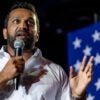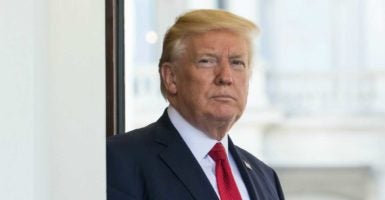Four months after taking office, President Donald Trump is taking his first foray onto the world stage. Over the course of the next seven days he will travel to Europe and the Middle East, visiting four countries as well as the Vatican: Saudi Arabia, Israel, Belgium, and Italy. Across the Atlantic, he will take part in a mini-summit in Brussels, as well as the G7 summit in Taormina, Italy.
The president’s overseas tour is an important opportunity to project U.S. leadership, stand shoulder to shoulder with key U.S. allies, and strengthen partnerships that have formed the bedrock of U.S. strategic interests for decades.
In Europe, there will be intense scrutiny of Trump’s participation in the NATO mini-summit, at a time of mounting Russian aggression. His message in Brussels must be loud and clear: The United States will resist any attempt by Moscow to threaten the sovereignty of the Baltic states and NATO member states in Eastern Europe.
At the same time, the president should reiterate his earlier calls for increased defense spending by all NATO members. NATO’s European partners can and must do more to invest in their own defense. It is unacceptable that just five NATO countries currently meet the agreed minimum spending commitment of 2 percent of gross domestic product on defense.
>>> Are NATO Members Carrying Their Weight? Only 5 of 28 Countries Pay ‘Fair Share’
Trump’s presence at the NATO mini-summit is crucial. As the leader of the free world, his voice must be heard at a time when Russia is increasingly flexing its military muscle on NATO’s borders. NATO is the backbone of the free world, and its preservation and advancement is a fundamental U.S. national interest.
The Brussels meeting is also a significant chance for the president to demand that Moscow end its occupation of Crimea, and withdraw its forces from Ukrainian soil. Russian President Vladimir Putin’s invasion of Ukraine is an affront to the principles of national sovereignty and self-determination, and has resulted in the deaths of 10,000 Ukrainians, and the displacement of 2 million people. Ukraine may not be a member of NATO, but it is an ally of the United States, led by a pro-Western government that seeks to break free of Russian attempts to dominate it.
There are many ways in which the U.S. can support Ukraine in its hour of need, from sending defensive weapons to Kyiv to enhancing existing sanctions against Moscow. Putin understands only two things: strength and resolve, both of which must be projected by the entire NATO alliance next week.
Trump’s visit to Europe will be preceded by meetings in Israel and Saudi Arabia, two key U.S. allies in the Middle East.
The focus in both countries is expected to be upon next steps for reining in Iran’s nuclear ambitions, and strengthening the international coalition to defeat the Islamic State, or ISIS. Trump’s visit is also symbolically valuable. Israel and Saudi Arabia were treated in a dismissive fashion by the Obama administration, and the U.S.-Israeli relationship in particular was damaged by President Barack Obama’s disdain, even outright hostility, toward Israeli Prime Minister Benjamin Netanyahu.
Ties between Washington, Tel Aviv, and Riyadh were also strained by Obama’s relentless drive to strike a nuclear deal at any cost with the rulers of Iran, a tyranny that has on numerous occasions threatened to wipe Israel “off the map.”
One of the most striking aspects of the Trump administration’s foreign policy so far has been its focus on revitalizing and advancing traditional U.S. alliances, from the Anglo-American “special relationship” to the U.S.-Japan partnership. This is the right approach.
The Obama presidency’s “leading from behind” mantra was highly damaging to American interests, and projected weakness rather than strength, leaving many U.S. allies confused and doubting America’s commitment to international leadership. The Obama doctrine proved disastrous in the Middle East, allowing for the rise of ISIS following the withdrawal of U.S. forces from Iraq, and resulted in a reckless nuclear deal with Tehran imposed against the wishes of America’s partners in the region.
On his first foreign tour, Trump must lead from the front, stand with America’s allies, and project strength and resolve in the face of America’s enemies. As we witnessed in the last eight years, a world without robust U.S. leadership is an increasingly dangerous place. It is time for the new occupant of the Oval Office to reverse the failed approach of the Obama era emphatically.






























